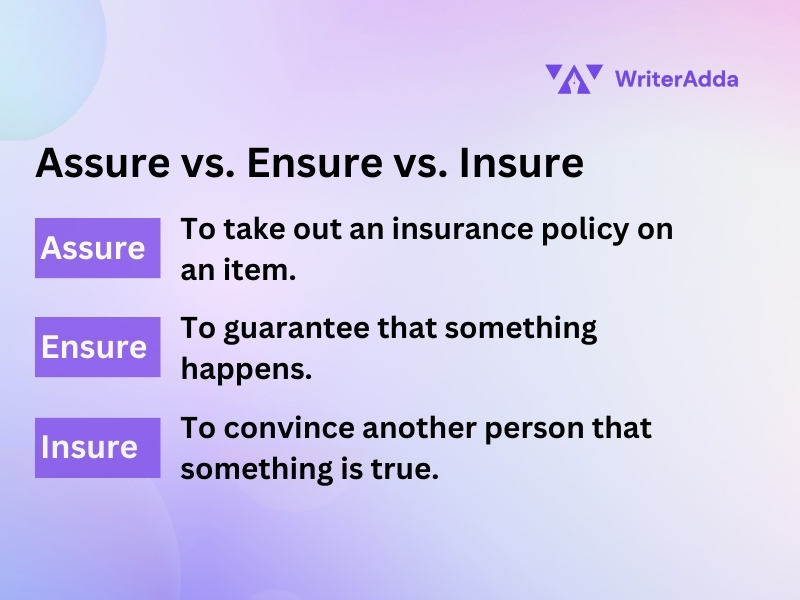According to some sources, individuals interchangeably use the words assure, ensure, and insure. Each of the three verbs has a unique meaning that makes it better suitable for specific purposes than the other two, even though they are all related to “making sure” and comparable. So they might not be a trio that can be used interchangeably, but rather just frequently misunderstood terms.
Ultimately, the words assure, ensure, and insure come from the Latin scrus, meaning “safe.” Like many words with common predecessors, the meanings of these phrases might overlap, and, in some instances, they still serve as synonyms. In truth, assure and insure have a similar origin; for hundreds of years, insure was just a spelling variation. They were essentially the same term! So what should a sophisticated word lover do? For starters, we can assist you in concentrating on the many distinctions between the words guarantee, ensure, and insure in modern usage. It’s not as painful as it sounds, we promise!
What does “assure” mean?
The first of the three, assure, was introduced into English with the reflexive connotation of “to have confidence, trust, or rely.” To put someone’s mind at ease, the phrase is most frequently used nowadays to indicate “to state with confidence to” or “to cause to know surely,” as in Despite all the difficulties, she assured us everything would work out. Although the phrases ensure and insure can sometimes be used interchangeably, today’s meaning of assure (“to state with confidence to”) is distinct. According to The Chicago Manual of Style, we ensure things and insure events. However, we assure them that we are taking their worries seriously.
For Example:
A human or an animal would be subjected to assurance. You may eliminate these creatures’ concerns or fears by assuring them and providing them with certainty.
- “I assure you we will arrive at the play on time.”
- “Tim received Tom’s assurance that their dog couldn’t escape throughout the night by locking the door.”
- The term “assurance” can also be used to describe a specific sort of insurance in the UK and other Commonwealth nations:
- “I’m considering purchasing a life assurance plan.”
- “Rest assured that Brazil will have a great World Cup in 2014,” Rebelo said. (Washington Post)
- “I assure you I meant no harm. (V for Vendetta)”
- “He considered retirement before doctors assured him he could still fight. (Newsweek)”
What does “ensure” refer to?
Soon after assure, the verb ensure entered English, meaning “to declare earnestly; state with confidence to.” These days, it is frequently used to denote the act of ensuring or securing a result or progress, as in Your seat at the event is guaranteed with this ticket.
For Example:
When you guarantee something, you are ensuring that it will occur.
- “I need to study more to ensure I get a passing grade.”
- “Last night, he scored 35 points, ensuring his team’s spot in the championship game.”
- “Before going overseas, ensure your passport is up to date.”
- “Martin ensured his phone was in his pocket before heading to work.”
- “Emma ensured she wouldn’t sleep in by setting her alarm at 6 a.m.”
- Aides said the leaders conferred by telephone to ensure that their speeches, while different in tone, would not be incompatible. (Reuters)
- Roast Brussels sprout mixture on a sheet pan for 12 to 15 minutes, shaking the pan about halfway through to ensure even cooking. (New York Times)
- The “feed kids first” policy ensures parents can eat peacefully. (New York Times)
What does insure mean?
As we’ve learned, the word insure originated as a synonym for assure. But by the middle of the 1600s, “insure” had changed to “to pay a sum to secure indemnity to or on, in case of loss, damage, or death.” While assure and insure can be used interchangeably, insure is now distinguished by this financial connotation. Insure is usually used to discuss getting or giving insurance, as The business declines to insure him once more in light of his numerous auto accidents. However, when discussing other types of risk, the word “insure” is often used with the phrase “against,” as in arranging an early reservation, we protected ourselves against being let down.
For Example:
When something or someone is insured, it is protected by an insurance policy, which is a contract stipulating that if something unfortunate occurs to the insured person or thing, the insurance provider will make compensation:
- “The law requires me to obtain auto insurance even if I don’t want to.”
- “Our home won’t be covered against floods, according to the insurance provider.”
- Sportswear manufacturer BLK’s receivers have moved to assure the company’s customers it will be “business as usual” amid uncertainty among professional sporting outfits. (The Sydney Morning Herald)
- Beyond the numbers, California’s electric vehicle policies are leading the way by ensuring that low-income communities benefit from zero tailpipe emissions. (The Sacramento Bee)
- This means drivers, typically paying around £50 a year to the Treasury when they insure their car, will see it rise above £60. (The Guardian)
- Very well then, listen: You know our house was insured for a good deal of money — fifteen thousand dollars. (Gabrielle Emile)
- Euro-area finance chiefs meeting tonight also will discuss using the European Financial Stability Facility to insure bonds of troubled governments. (Business Week)
- Remarkably, younger and healthier individuals in other industrialized countries have long accepted the mandate to be insure din return for community-rated premiums and guaranteed issues. (New York Times)
How to use assure, ensure, and insure:
As you can see, although each phrase does it somewhat differently, they all refer to the process of making certain or guaranteeing. By using the term assure, you may reassure someone and alleviate any concerns they may have. The definition of the verb assures to ensure anything. To insure is to purchase insurance protection. The only one of the three that specifically mentions insurance plans and monetary risk is insurance. Its usage will be made more evident by the following instances:
- You realize you need to ensure that automobile before driving it, right?
- Armando spent a lot of money on insurance for his former home.
Assure, a verb used as a synonym for assured means to “declare earnestly” or with confidence. It relates to how a scenario will turn out. For instance:
- The instructor gave the pupils assurance that they were ready for the test.
- Can you assure us that we have enough vaccines for everyone?
- The squad must practice as much as possible to ensure a convincing victory on Saturday.
- We can’t ensure the effectiveness of this marketing strategy with a budget so little.
Conclusion
When they genuinely mean assure, folks occasionally use ensure or insure to alleviate confusion. In Garner’s Modern American term, Bryan Garner notes that the term is now “ubiquitous.” By reading this, we can only reassure you that there is a distinction and that you are familiar with homonyms, but regrettably, we cannot provide insurance. Simply put, this is not that type of party.




